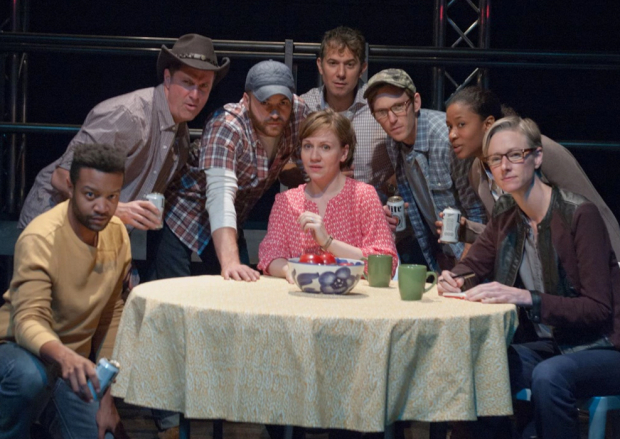
(© Lara Goetsch)
As one of the head writers on Tectonic Theater Project’s collaboration with Moisés Kaufman for the play The Laramie Project, Leigh Fondakowski proved herself to be a skilled documentarian and playwright in crafting the powerful docudrama about the 1998 murder of Matthew Shepard, turning hundreds of hours of interviews into a provocative, in-depth look at a brutal hate crime.
Fondakowski employed the same skills when creating Spill, which is now receiving its world premiere at TimeLine Theatre. The plot revolves around the 2010 BP oil rig explosion that left 11 men dead and sent millions of gallons of oil gushing into the Gulf of Mexico. Everyone gets their say in the story about how the largest accidental marine spill occurred as the result of an explosion on the rig. We hear from BP execs, engineers, scientists on the doomed rig, congress people, geologists, fishermen, reporters, members of the cleanup crew, and widows of the men killed.
No stone is left unturned as everyone weighs in with their own view of the tragedy from their wholly unique perspective. Unfortunately, that’s also where the play lacks the clarity and the tension, with too many characters having their say. Fondakowski’s two-and-a-quarter hour play needs pruning in order to better provide a nuanced, multifaceted look at the complicated relationship the U.S. has with oil. To this end, Spill only skims the surface.
Much of Fondakowski’s dialogue is rife with industry jargon, further robbing the piece of emotional heft. And with everyone in TimeLine’s nine-person ensemble double or triple cast, you almost need a scorecard to keep up with who's playing whom.
As the director, Fondakowski helms Spill with a sense of stylized movement to match the dialogue. This, too, is problematic. The ensemble provides a kinetic background to foreground dialogue, leaping and stretching as story unfolds. This exaggerated pantomime and modern-dance-like physicality distracts more than enhances, especially during the climactic scene at the end of Act 1, where there’s an overabundance of histrionic slo-mo, which is effective initially, but which goes on so long it winds up being affected, especially when combined with the use of flashing red lights and haze effects.
Fondakowski’s cast is solid, which helps to elevate the flawed script. Craig Spidle makes Deepwater Horizon senior staffer Randy Ezell a quietly heroic Everyman. Justine C. Turner is moving as an oil rigger’s wife. As the narrator, the reliably excellent Kelli Simpkins radiates warmth and intelligence and, when recounting the devastation BP created, a cold, barely discernable fury that subtly highlights the fact that this tragedy could have been averted.
Sarah Lambert’s set is a maze of metal scaffolding and platforms that evokes the mass and grandeur of an offshore oil rig. Projection designer Mike Tutaj has backed the set with flickering renditions of the ocean, the Louisiana wetlands, and footage from an underwater camera that caught the torrent of oil spewing into the Gulf. If you’re sitting stage right or stage left, however, you won’t see much of this. The sightlines for the video footage are limited.
Spill is compelling only primarily to its rock-solid cast. But if you come expecting a truly insightful, multifaceted look at the Deepwater Horizon tragedy, you’ll be disappointed, as Spill sticks primarily to the shallows.









